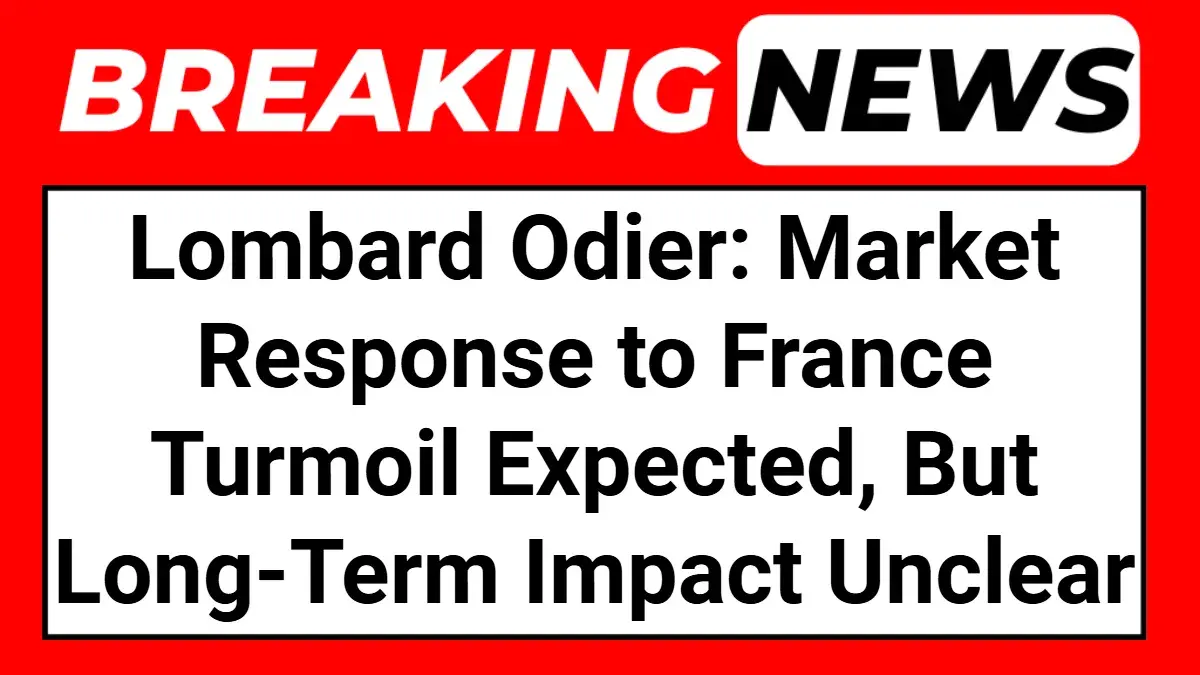Lombard Odier: December 4, 2024 — In the wake of France’s ongoing turmoil, a top investment firm, Lombard Odier, has weighed in on how the financial markets are reacting. According to the firm, the market’s response to the recent unrest in France is not surprising. The Swiss-based asset management company believes that the market’s reaction is consistent with the uncertainty created by political and social instability.
Recent protests, strikes, and civil unrest in France have shaken the nation. These protests are largely in response to government policies, economic challenges, and social inequality. As the situation continues to develop, the financial markets have shown signs of volatility. However, Lombard Odier, a firm known for its expertise in managing investments, stated that this market reaction was expected.
The Context of the Unrest in France
Over the past few months, France has been facing mounting social and political unrest. Large protests have erupted across the country, mainly in response to government reforms and rising costs of living. Issues such as high unemployment, rising inflation, and a growing sense of dissatisfaction with the government’s handling of the economy have contributed to the unrest.
The protests have sometimes turned violent, and strikes in key industries have caused disruptions. French citizens are demanding change, and their frustrations are increasingly being voiced in the streets. This has created a sense of uncertainty within the country, and the impact of this instability is being felt across various sectors, including the economy and financial markets.
Lombard Odier’s Analysis
Lombard Odier, one of the world’s leading private banks, has a long history of analyzing global financial markets. The firm has a reputation for closely monitoring political and economic developments that could impact investments. In a recent statement, Lombard Odier highlighted that the market’s current reaction to the unrest in France is in line with their expectations.
The firm explained that markets typically react to instability with short-term volatility. When there is uncertainty about a country’s political stability or its economic future, investors often become cautious. As a result, stocks, bonds, and other financial assets may experience sharp price swings.
However, Lombard Odier also noted that the long-term effects of the unrest on France’s financial markets will depend on how the situation evolves. If the unrest leads to significant political changes or economic reforms, it could have a lasting impact on the country’s market performance. On the other hand, if the situation remains unresolved or continues to worsen, the impact on the markets could be more negative.
Market Reactions So Far
As the unrest in France has continued, financial markets have been showing signs of nervousness. The French stock market has experienced fluctuations, with some companies seeing a drop in their stock prices. The French government bonds have also been under pressure, as investors worry about the economic consequences of prolonged unrest.
In addition, the European stock markets have been affected by the turmoil in France. France is one of the largest economies in the European Union, and instability in the country can have a ripple effect on the broader European market. The euro has also seen some weakness, as investors are wary of the potential long-term economic impact of the unrest in France.
Despite these challenges, Lombard Odier emphasized that market responses to political instability are not unusual. They pointed out that markets often experience short-term shocks during periods of political unrest or social upheaval. It is only when the situation stabilizes, and the direction of the country becomes clearer, that the markets can begin to recover.
The Bigger Picture: Global Concerns
The situation in France is not isolated. Across the globe, there have been increasing concerns about political instability and economic challenges. From rising inflation and interest rates to protests and strikes in other countries, the global economic landscape is facing numerous challenges. These challenges have contributed to overall market volatility in recent months.
Lombard Odier noted that while the unrest in France is certainly significant, it is part of a broader pattern of instability being seen in various parts of the world. For investors, this means navigating a more unpredictable global market. Economic uncertainty, political tensions, and social unrest are all factors that investors must consider when making decisions.
Long-Term Outlook
Looking ahead, Lombard Odier believes that the market response to the French turmoil will continue to depend on how the situation develops. If the French government is able to address the underlying issues causing the unrest, it could lead to greater stability in the markets. However, if the protests continue or worsen, it could result in more significant financial challenges for the country and its economy.
In addition, the broader European market could feel the effects of prolonged instability in France. As one of the largest economies in the EU, France plays a central role in the region’s economic health. Therefore, any significant downturn in France’s economy could have wider implications for the rest of Europe.
For investors, Lombard Odier recommends maintaining a cautious approach in the short term. The firm suggests closely monitoring developments in France and across Europe, as the situation remains fluid. While the market’s reaction to the unrest in France is not surprising, the long-term impact remains uncertain.

